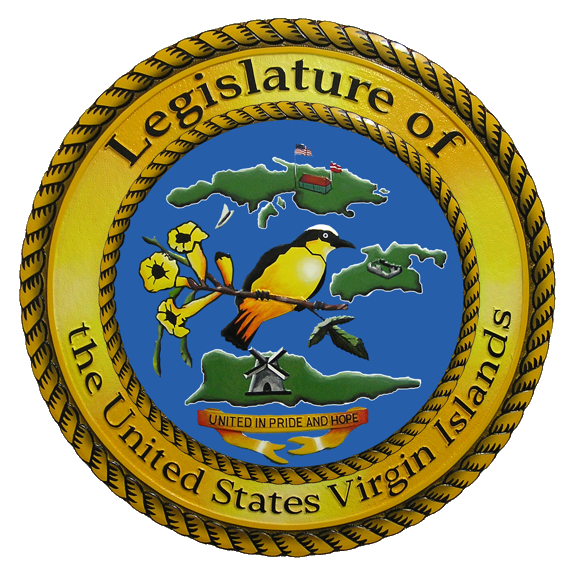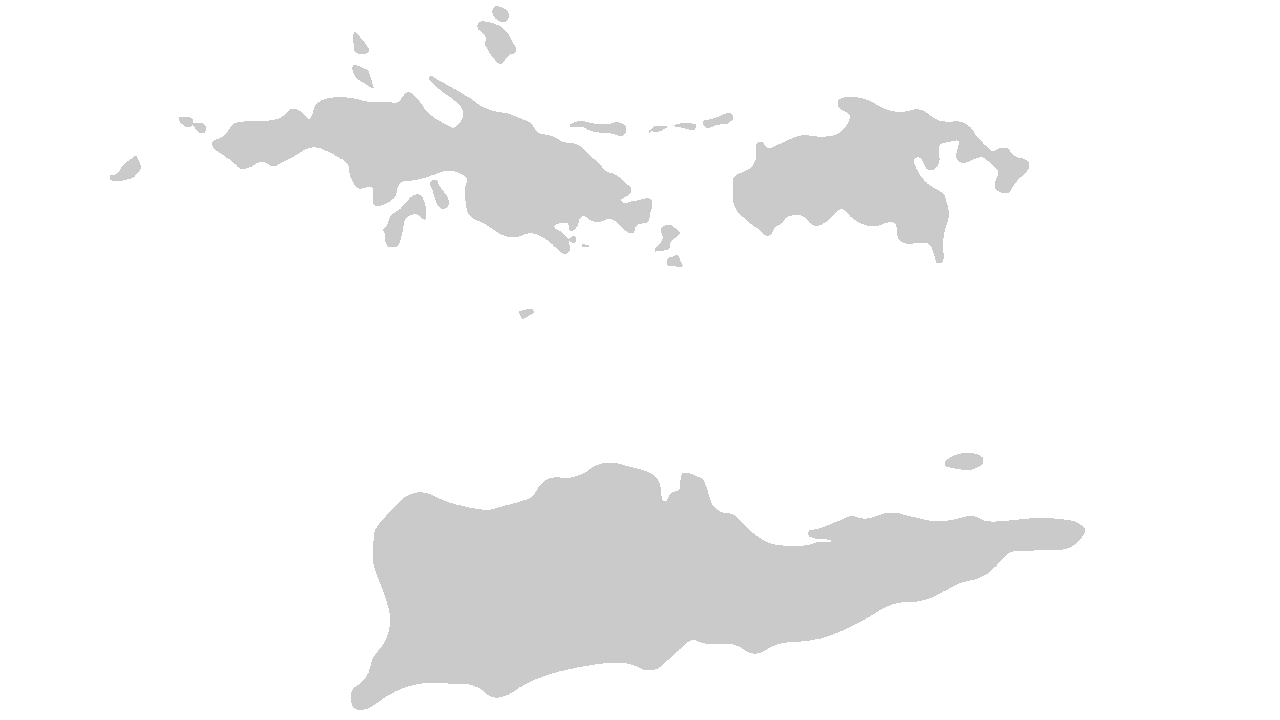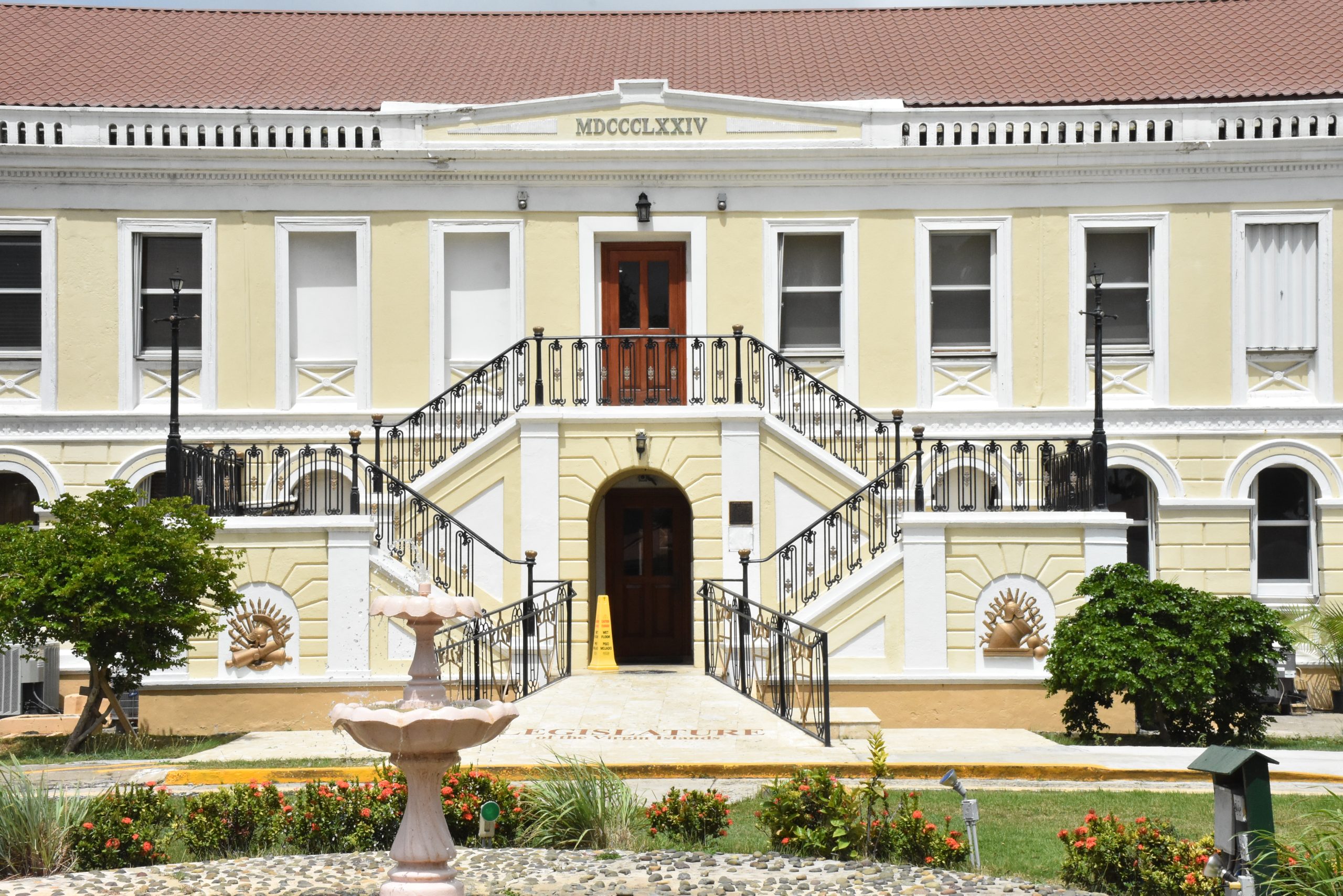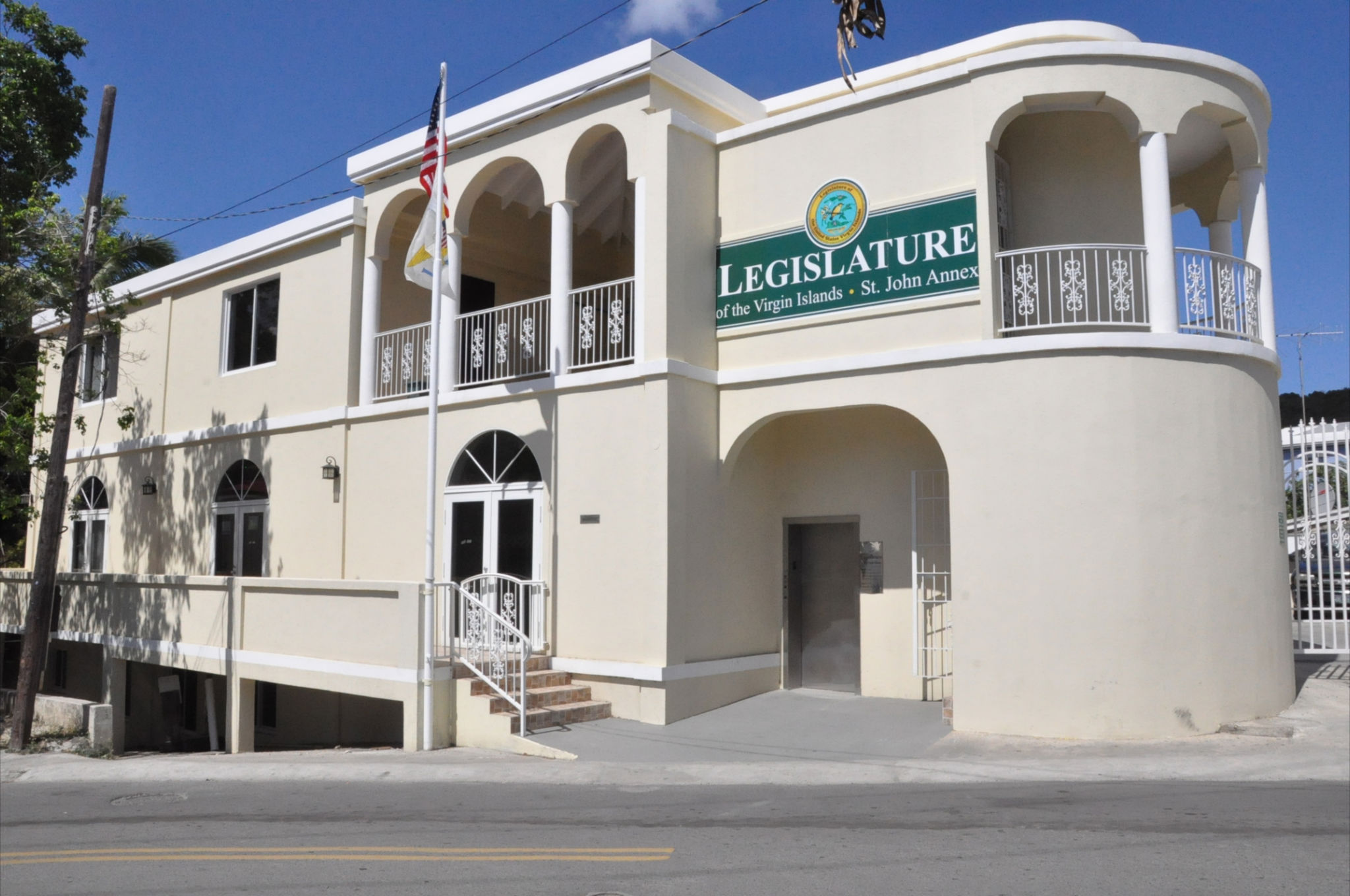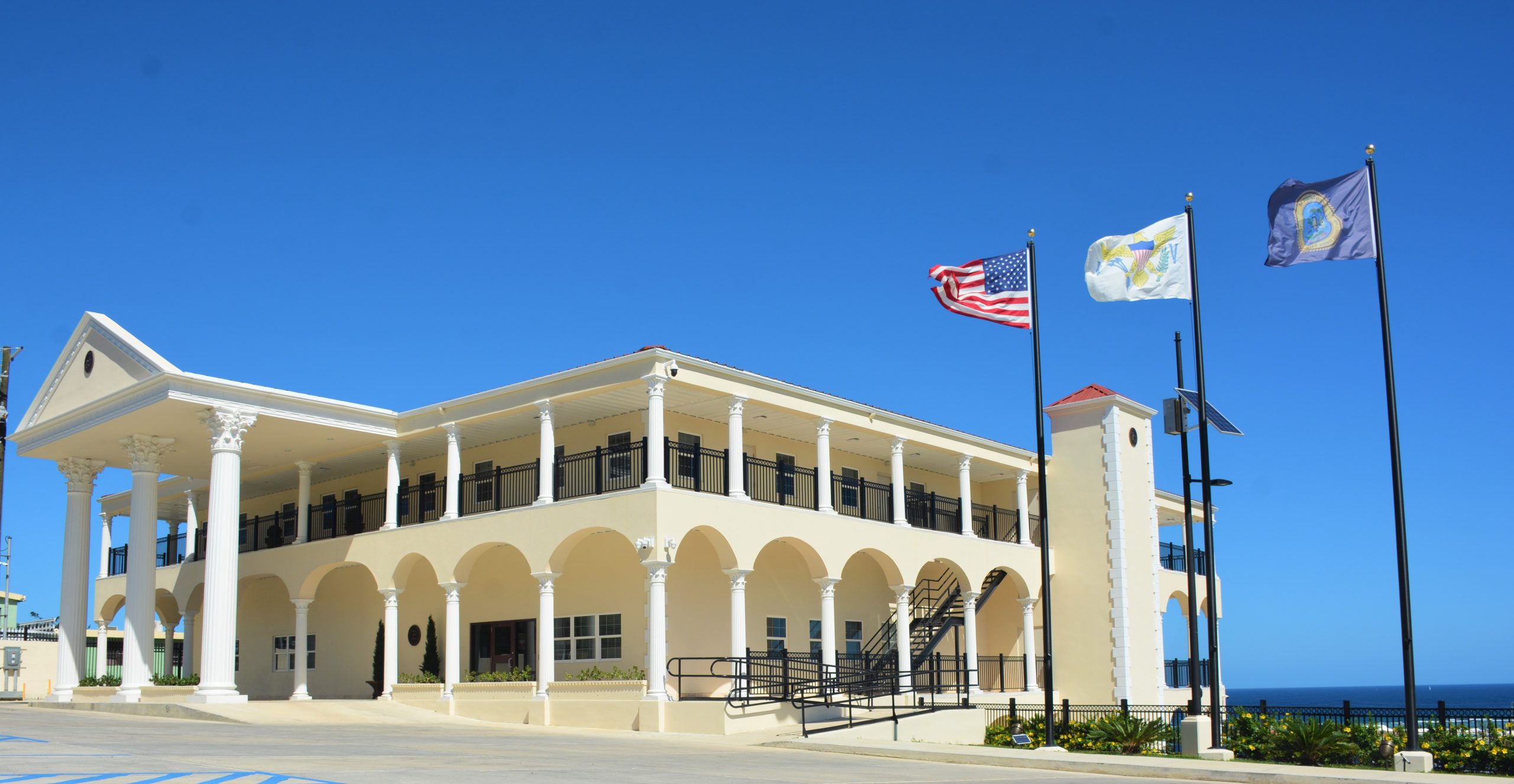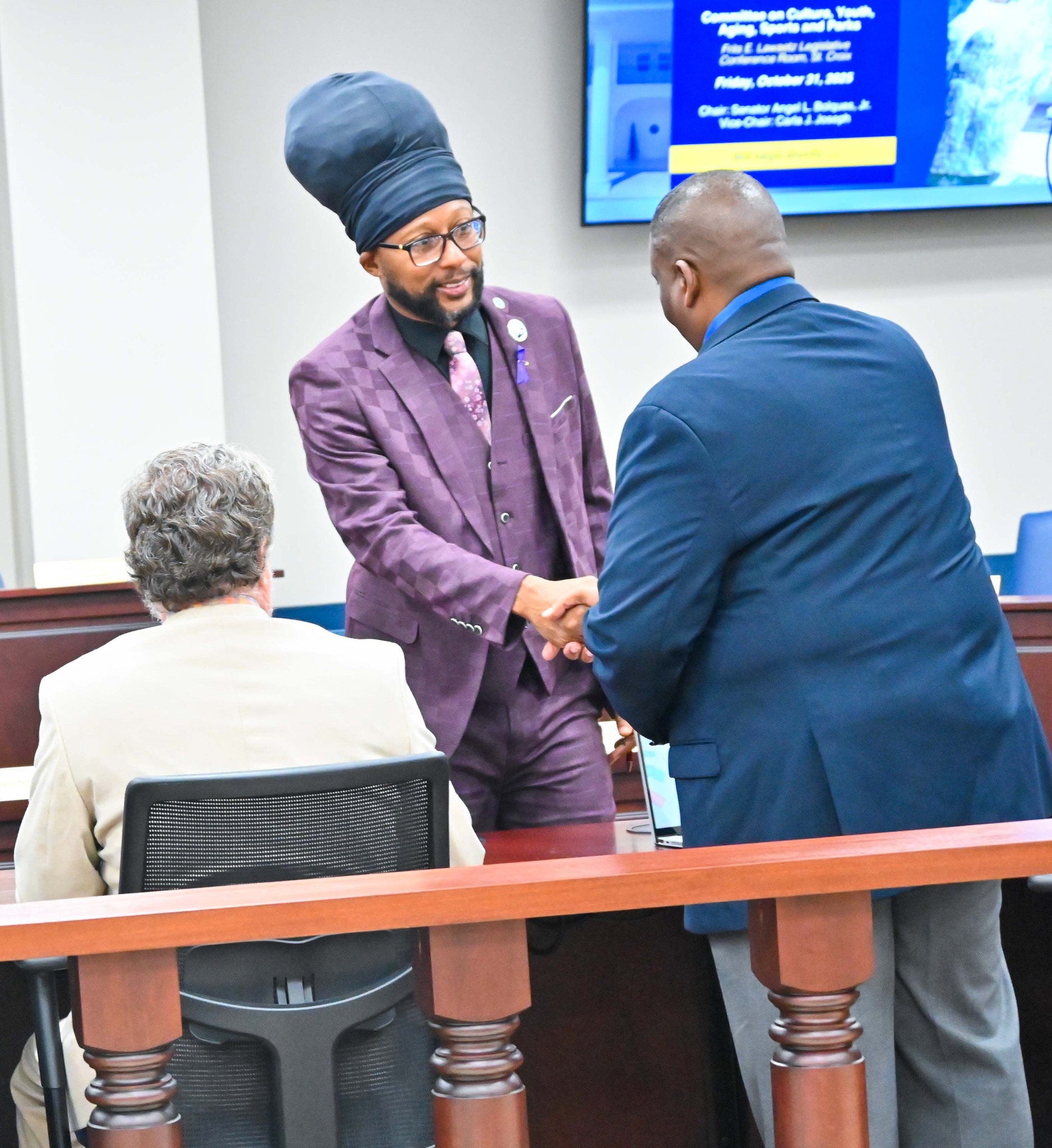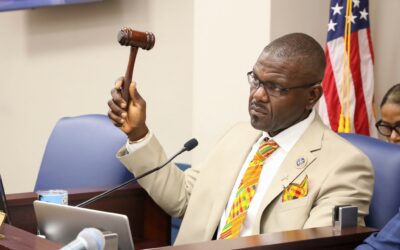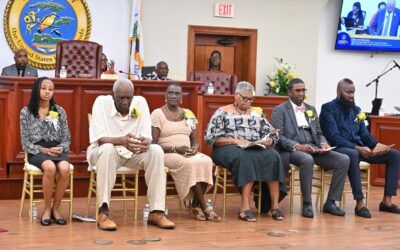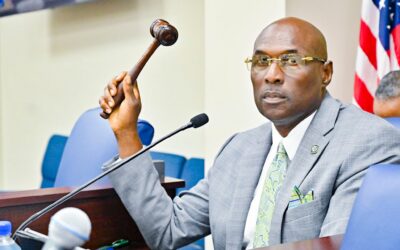ST. CROIX, VI – The Committee on Culture, Youth, Aging, Sports, and Parks, led by Senator Angel L. Bolques, Jr. met at the Frits E. Lawaetz Legislative Conference Room. Lawmakers heard testimony examining the pressing and multifaceted challenges affecting the youth of the Virgin Islands. Topics included but were not limited to the intersections of public health, education, economic opportunity, and community support as they relate to youth development, safety, and success, particularly in the face of rising violence, trauma, and systemic inequality.
Senators first received testimony to examine the rise of youth violence in the Virgin Islands as a public health emergency.
Dr. Nicole Craigwell-Syms, Assistant Commissioner of the Virgin Islands Department of Health, testified on behalf of Commissioner Justa Encarnacion, emphasizing that youth violence in the Virgin Islands reflects a broader public health crisis driven by poverty, trauma, and limited behavioral health resources. Nearly one-third of local children live below the federal poverty level, facing daily insecurity that results in chronic stress and aggression. The lasting effects of Hurricanes Irma and Maria, the COVID-19 pandemic, and ongoing community violence have added to these challenges, contributing to rising rates of depression, anxiety, and suicidal behavior among youth. Dr. Craigwell-Syms highlighted the need for culturally responsive, community-based interventions and mentioned ongoing initiatives such as the Behavioral Health Division’s school outreach, the “Zen Van” counseling program, and the “Positive Vibes Alone” prevention campaign to promote coping skills and reduce substance use among young people.
Antonio Emanuel, Executive Director of the Office of Gun Violence Prevention, reported that the agency continues to implement community-based strategies to reduce violence. Through partnerships with law enforcement, schools, nonprofits, and faith-based groups, the Office has facilitated over one hundred prevention and education events, including anti-bullying and conflict resolution programs. Emanuel emphasized that gun violence is being addressed as a public health issue, requiring collaboration across government and community sectors to maintain progress and reduce homicides. Representing Commissioner Mario Brooks, Sergeant Danisha Samuel-Santos of the Juvenile Bureau discussed the Department’s ongoing efforts to address youth violence. VIPD recommends stronger interagency protocols, greater investment in school-based behavioral health, and expanded support for youth prevention and mentorship programs to build a safer community.
Attorney General Gordon Rhea reported that while youth arrests and incarceration rates are decreasing nationally, the Virgin Islands continues to experience youth firearm violence and high juvenile reoffending. The DOJ emphasized the need for more youth engagement programs, safe community spaces, and technical training opportunities.
Chystie Payne, Program and Development Director at My Brother’s Workshop recommended recognizing workforce training as violence prevention, investing in community-based capacity building, and increasing government funding for intervention programs.
Lawmakers then shifted the focus to long term structural conditions shaping youth success in the Virgin Islands. This included educational access, vocational, training, and workforce readiness disparities. This also encompassed data on school dropout rates, employment trends, and the underutilization of existing youth development programs.
Dr. Haldene Davis, Director of the Virgin Islands Bureau of Economic Research highlighted the availability of opportunities in education, recreation, employment, and entrepreneurship in the territory, but empathized a need for a more target approach to youth development. Although there has been progress, challenges have persisted. These include a youth unemployment rate of 25.3% in 2024, a 4.6% drop out rate among 16–19-year-olds in 2022, and 263 youth arrests for violent crimes in 2023. The average household income for families receiving housing vouchers was $25,061 in 2023. Davies advocated for phased, sustainable initiatives that offer living wages and transformative engagement, particularly through early intervention programs to support at-risk youth. As of December 2024, non-environmental employment totaled 35,443, with 24,667 in the private sector and 10,776 in the public sector.
Population decline remains a concern, with the official 2020 Census showing a drop to 87,146 residents from a peak of 108,612 in 2000, due to the refinery closure, hurricanes, and the pandemic, which led to 14,550 people relocating to the mainland. However, 2025 Census estimates suggest a population of 103,792, with a net gain of 181 people between January 2021 and June 2025. The demographic is aging, with 37% aged 55 and older, and only 15% under age 14. While most residents have at least a high school diploma and income improves with education, the territory faces underemployment and labor shortages. Public school enrollment has dropped by 3,000 students since 2017, and academic proficiency remains low. Graduation rates have risen to 83.9%, though still below mainland levels, and career and technical education programs have declined due to funding and staffing limitations.
Victor Somme III, Assistant Commissioner of the Virgin Islands Department of Education said that there are currently 10,263 students enrolled in public schools in the territory. As of October 28, 2025, the St. Croix District has 4,991 students. The St. Thomas St. John District has 5,272 students. All children between the ages of 5 and 18 must be enrolled in an educational instruction program. The dropout rate in the territory stood at 3% in the 2024-2025 school year. 189 students did not graduate in the 2022-2023 school year. This has since decreased every school year, with 168 students not graduating in 2023-2024 and 136 not graduating in 2024-2025. Somme stated that the dropout rate has decreased due to intervention strategies at Virgin Islands high Schools. Additionally, immediate intervention, such as allowing students to immediately retake a failed course instead of waiting until summer school has reduced learning loss.
Somme also spoke of Career and Technical Education pathways which are designed to equip students with practical skills and knowledge directly applicable within industries in the US Virgin Islands and the broader national labor market. Somme stated that employers in the USVI often struggle to find qualified workers, and that CTE programs address the gap by providing students with technical competencies and essential employability skills, including communication, critical thinking, and problem solving. CTE graduates often leave high school with industry recognized certifications, technical skills, or licenses, which make them immediately attractive to employers and reducing the time and cost associated with entry level training. 9,905 students were enrolled in CTE programs at the Department of Education. 5,002 of them were secondary students, including 825 Secondary CTE Concentrators (students completing two or more consecutive classes in a pathway) and 4,127 elementary and middle school CTE Participants (exploratory students taking fewer than two classes). Challenges remained for the program, due to limited resources that must be divided throughout the territory. Many CTE classrooms are operating with outdated equipment. Additionally, low student enrolment, outdated vocational mindset, limited employer engagement, and insufficient student support has caused concern.
Genevieve Whitaker, Executive Director, Career & Technical Education Board said that she has prioritized collaboration and stake holder engagement since beginning her tenure. CTE programs in the US Virgin Islands have included high demand sectors such as health sciences, IT, hospitality, construction trades, and finance. Institutions such as the Raphael O. Wheatley Skill Center and the St. Croix Career and Technical Education Center offering training opportunities for youth and adult learners. Whitaker said that even with progress, the board has faced constant challenges, including instructor shortages, outdated infrastructure, and funding constraints. Whitaker renewed the Board’s request for a $600,000 appropriation to establish the “Ms. Lena Schulterbrandt CTE Fund”, which would support internships, equipment repairs, instructor development, and student organizations. Current initiatives underway include expanding career pathways in emerging fields, dual enrolment partnerships, and regional collaborations. National statistics underscore CTE’s effectiveness, with a 96% graduation rate among concentrators and strong links to reduced dropout rates and increased student engagement.
Dr. Gary Molloy, Commissioner of the Virgin Islands Department of Labor reminded the body that the Virgin Islands Workforce Development System focuses on building a robust talent pipeline aligned with target industries in the territory. Through the USVI American Job Center and its one Stop Operator Eqqus, housed in VIDOL office, individuals can receive tailored services based on their employment needs. The five-stage pipeline, Inform, Attract, Acquaint, Train, and Hire, connects classroom learning with workforce readiness. The Youth and Apprenticeship Division of VIDOL administers a variety of programs for those aged 14-25 supporting career exploration, skill building, and employment. The division leverages federal and local funding to meet diverse workforce needs and partners with schools, employers, and community organizations to provide mentorship and real-world experience.
Renee Hansen, Assistant Commissioner of the Department of Sports, Parks, and Recreation outlined a plan to empower youth through safe spaces, structured activities, and mentorships. DSPR currently offers a wide range of programs across all three islands, including summer enrichment, territorial sports leagues, boxing mentorship, after-school recreation, and sports clinics. Notable achievements include the success of the USVI RBI Baseball/Softball teams on national stages. Upcoming initiatives such as Recreation-in-Motion, Walk Out Wednesdays, and the Summer Cultural Arts Series aim to expand access and foster cultural pride. These programs are designed to build character, discipline, and community identity.
Hansen also emphasized the department’s role in workforce development through internships and summer employment, helping youth gain practical skills in park maintenance, event coordination, and leadership. However, the department faces challenges including aging infrastructure, limited staffing and funding, and unequal access in remote areas. To address these concerns, DSPR recommended modernizing facilities, expanding workforce pathways, investing in cultural arts, and enhancing mobile programming. Strong community partnerships with schools, nonprofits, sports federations, and civic groups remain central to DSPR’s efforts to create inclusive, impactful youth development opportunities across the territory.
Chair Bolques voiced concern about the CTE Programs, asking what the effort was to modernize CTE Labs in the coming years. Carla Bastian-Knight, St. Croix District Insular Superintendent said that as funding has become available and more flexible, upgrades would be undertaken at specific classrooms. Bolques stated that we now see a very vibrant, broad picture of the state of the youth in the Virgin Islands. Bolques called the meeting broad and so important and thanked the departments for their participation.
Senators present at today’s committee hearing included Angel L. Bolques, Jr., Carla J. Joseph, Marvin A. Blyden, Alma Francis Heyliger, Novelle E. Francis, Jr., and Franklin D. Johnson
The Division of Public Affairs is committed to providing the community with accurate information on legislative proceedings and other events at the Legislature of the Virgin Islands. Visit legvi.org.
####
